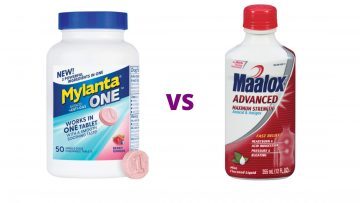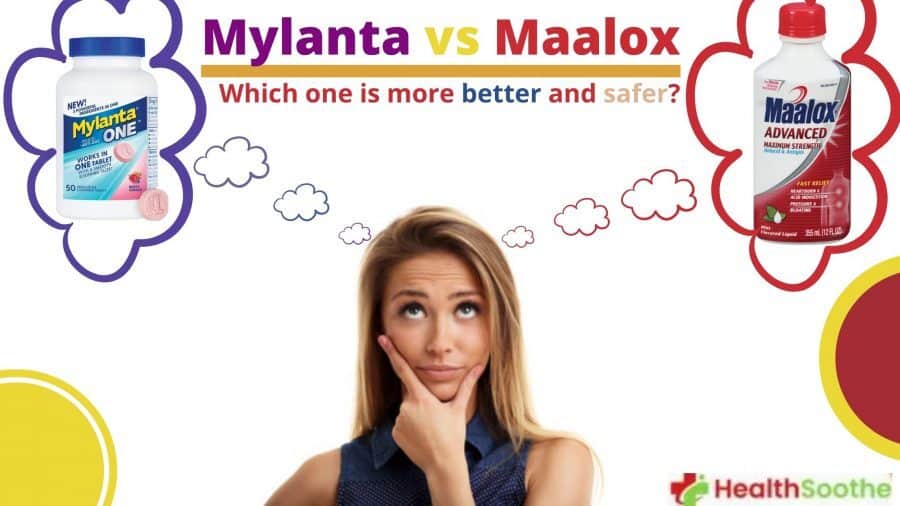If you are reading this article, then you probably know what Mylanta and Maalox are, or what they are usually prescribed for.
Quick Facts About Mylanta and Maalox
Anytime you have stomach or indigestion problems like diarrhea, heartburn, gastroesophageal reflux disease (GERD also called acid reflux), duodenal and gastric ulcers, stress gastritis, pancreatic insufficiency, non-ulcer dyspepsia, constipation, and others, both of these drugs have been recommended for you to choose one and use it to treat yourself, but the problem many people face is knowing the right one to choose between these two antacids.
Some people might even do the wrong thing by taking both at the same time since they can’t decide which is better, and this leads to side effects that can be major.
Knowing the right one to choose between two antacids has always been a problem for people who are recommended these drugs, but don’t worry, because this article got you covered.
Today, we will compare both antacids - Mylanta vs Maalox, by analyzing both from top to bottom on what you need to know about each so that you will see which one is right for you without thinking too much or stressing yourself.
We have gone through the trouble of doing the research for you, so dig in and get enlightened.
About these drugs: Mylanta and Maalox - What are they?
Mylanta and Maalox are both drugs that belong to a class called Antacids. Antacids are a kind of drug that neutralizes stomach acid.
They include substances that serve as bases (alkalis) to neutralize stomach acid and maintain its pH.
Antacids are medications that are used to treat the symptoms of Gastroesophageal Reflux Disease (GERD, often known as acid reflux), heartburn, or indigestion (also called dyspepsia).
Antacids are also used to treat symptoms such as burning in the chest or throat produced by acid reflux, a bitter taste in the mouth, a persistent dry cough, discomfort while laying down, regurgitation by neutralizing stomach acid, and other certain related stomach or GIT problems.
Maalox and Mylanta are two well-known brands of fast-acting antacids.
Mylanta vs Maalox - How does each work?

To know each work, let’s first check out their ingredients or constituents;
Ingredients of Mylanta
Active ingredients are;
- Magnesium hydroxide
- Simethicone
- Aluminum hydroxide
Inactive ingredients include:
- Sorbitol
- Sodium carbonate
- Microcrystalline cellulose
- Sucralose
- Xanthan gum
- Purified water
- Carboxymethylcellulose sodium
- Benzyl alcohol
- Glycerin
- Flavors
Ingredients of Maalox
Active ingredients are;
- Magnesium hydroxide (antacid)
- Aluminum hydroxide (antacid)
Antacid combinations often include the above two chemicals.
Ingredients that are inactive include:
- Carboxymethylcellulose sodium
- Propylparaben
- Sorbitol
- Butylparaben
- Hypromellose
- Flavor
- Cellulose
- Microcrystalline
- Purified water
- Saccharin sodium
Mylanta - How it works
In contrast, Mylanta includes magnesium hydroxide, aluminum hydroxide, and simethicone.
It is lactose, gluten, and saccharin salt-free, however, it contains mannitol, which may cause diarrhea in some individuals.
This drug works by neutralizing excess acid in the stomach, as well as raising the pH of the stomach.
Maalox - How it works
Maalox is a well-balanced combination of two antacids: aluminum hydroxide, which acts slowly, and magnesium hydroxide, which acts quickly.
In antacid combinations, the two are commonly mixed. Aluminum hydroxide is an astringent that may induce constipation.
This action is counterbalanced by magnesium hydroxide, which, like other magnesium salts, may induce diarrhea.
As a result, gastrointestinal adverse effects are uncommon with Maalox, making it particularly ideal for long-term treatment.
How the active ingredients work
- Magnesium hydroxide: It stimulates bowel evacuation by generating osmotic retention of fluid.
- Simethicone: This reduces the surface tension of gas bubbles to avoid gas pockets in the gastrointestinal tract.
- Aluminum hydroxide: This neutralizes stomach hydrochloride to generate aluminum chloride salt plus water for maintaining stomach pH.
Mylanta vs Maalox - How to use: Dosage and Administration
Dosage of Mylanta
The standard dose for adults and children over the age of 12 is 10 to 20 mL between meals and before night. The highest suggested dosage in 24 hours is 60 mL.
For the liquid version, according to Mylanta manufacturers, no more than 24 teaspoons should be consumed in a 24-hour period.
What happens if I miss dosed on Mylanta and what do I do to rectify that?
Nothing much will happen. Just that if you have missed significant doses of the drug, it will not be effective or potent enough to treat you for the ailment you took it for.
Do the following if you have miss dosed;
- If you forget to take one or more doses: take your next dose at the usual time and in the average amount. Do not take anymore than your doctor prescribed.
- If you miss one dose, skip it and continue with your normal schedule.
- You should consult your doctor on what to do if you don’t know what to do.
What happens if overdosed on Mylanta and what do I do to rectify that?
The following will happen if you overdosed on Mylanta;
- Constipation, diarrhea, a change in the color of stool motions, and stomach pains are all possible side effects. Calcium-containing products are more prone to induce kidney stones and constipation.
- Calcium is found in several antacids, including Maalox, Mylanta, Rolaids, and Tums. Calcium overdose may occur if you consume too much or for longer than recommended. Too much calcium might result in nausea.
- If used in excessive dosages, this medicine might cause bone disintegration because it alters phosphorus metabolism.
Call your healthcare provider if someone has overdosed on Mylanta and is experiencing significant symptoms like passing out or difficulty breathing.
Otherwise, contact a poison control center immediately. You can also consult your doctor if you have overdosed on Mylanta.
Dosage of Maalox
The normal dose is 2 pills, 4 times per day. It is advised to take the medicine after meals and before going to bed.
For the liquid version, Maalox manufacturers recommend taking no more than 16 tablespoons in a 24-hour period.
What happens if miss dosed on Maalox and what do I do to rectify that?
Nothing much will happen. Just that if you have missed significant doses of the drug, it will not be effective or potent enough to treat you for the ailment you took it for.
Do the following if you have miss dosed;
- If you forget to take one or more doses: take your next dose at the usual time and in the average amount. Do not take anymore than your doctor prescribed.
- If you miss one dose, skip it and continue with your normal schedule.
- You should consult your doctor on what to do if you don’t know what to do.
What happens if overdosed on Maalox and what do I do to rectify that?
The following will happen if you overdosed on Maalox;
- Constipation, diarrhea, a change in the color of stool motions, and stomach pains are all possible side effects. Calcium-containing products are more prone to induce kidney stones and constipation.
- Calcium is found in several antacids, including Maalox, Mylanta, Rolaids, and Tums. Calcium overdose may occur if you consume too much or for longer than recommended. Too much calcium might result in nausea.
- If used in excessive dosages, this medicine might cause bone disintegration because it alters phosphorus metabolism.
Call your healthcare provider if someone has overdosed on Maalox and is experiencing significant symptoms like passing out or difficulty breathing. Otherwise, contact a poison control center immediately. You can also consult your doctor if you have overdosed on Maalox.
Precautions and Warnings - Mylanta vs Maalox
Mylanta
You should not use it if;
- You have renal failure.
- You have kidney stones.
- You have gastrointestinal bleeding.
- You have a colostomy or ileostomy (a surgical incision in your abdominal wall).
- You have a blockage in your intestines or stomach.
- You have poorly functioning kidneys.
- You have a hole in your intestines.
- You are allergic to any of the components in this product.
- You are dehydrated or have reduced fluids.
Maalox
It should not be used for the set of people;
- People with diminished renal function.
- People with rare hereditary fructose intolerance issues.
- People with low phosphate levels in their blood.
- People on a low-phosphorus diet.
- Persons with porphyria, a rare hereditary blood condition.
- People who are debilitated or extremely weak.
These drugs are to be used by people who are 12 years of age and older.
People with a renal illness or on a magnesium-restricted diet should see their doctor before using any of these drugs.
Prescription medicine users should consult their doctor or pharmacist before using Maalox or Mylanta, since these antacids may interfere with other drugs.
During breastfeeding and pregnancy, these medications should be used only when prescribed by the doctor or clearly needed.
Uses - Mylanta vs Maalox
Mylanta is used for the following:
- To relieve stomach gas
- To cure heartburn
- To alleviate upset stomach
Maalox is used to treat the following
- Sour stomach
- Unsettled stomach
- Acid reflux
- Acid indigestion
- Heartburn
Side Effects - Mylanta vs Maalox
Side effects of Mylanta can include;
- Low platelet count
- Vomiting
- High levels of eosinophils (white blood cells)
- A localized eruption of the skin - Erythema multiforme
- Hives
- Skin rash
- Nausea
- Hairy tongue
- Oral yeast infection
- Low white blood cell count diarrhea
- Immediate or delayed hypersensitivity reaction
- Swollen or infected tongue
- Anaphylaxis (a life-threatening allergic reaction)
- Diarrhea
Maalox can have the following side effects if not taken as prescribed;
- Constipation
- Unusual fatigue or weariness
- Muscle weakness
- Diarrhea
- Appetite loss
All these side effects for both medications often occur when the drug is not taken as directed or prescribed, or if the user is allergic to any of the constituents or ingredients of these drugs.
Always make sure to consult before taking drugs like this, because there might be certain conditions or ailments you are in/have that make taking certain drugs dangerous.
Drug Interactions - Mylanta vs Maalox
Mylanta may react negatively to the following:
- Paricalcitol (Zemplar)
- Sodium polystyrene sulfonate (Kayexalate)
- Minocycline (a broad-spectrum tetracycline antibiotic)
- Digoxin (Lanoxin)
- Alcohol
- Quinine
- Orencia (used in the treatment of rheumatoid arthritis)
- Levaquin (levofloxacin)
- Doxycycline (Vibramycin)
- Calcitriol (Bioactive vitamin D)
- Pancrelipase (used to boost digestion of food for babies who do not have enough pancreatic enzymes)
- Ursodiol (Actigall)
- Mesalamine (Apriso, Rowasa)
- Cipro (ciprofloxacin)
- Any medication that is used before a colonoscopy
- Doxercalciferol (Hectorol)
- Amphetamine (A Potent Central Nervous System Stimulant)
- Methamphetamine (Desoxyn
- K-Phos (utilized in those who do not acquire enough phosphorus from their diet)
- Lisdexamfetamine (Vyvanse)
Maalox may react negatively to the following:
- Ketoconazole
- Deferiprone (used in the treatment of chronic iron overload that is transfusion-related)
- Mycophenolate
- Hydroxychloroquine
- Chlorpromazine (an antipsychotic medication)
- Deferasirox
- Alcohol
- Chloroquine (a medication used to prevent and treat malaria)
- Ferrous gluconate
- Itraconazole
- Enteric-coated tablets
- Ferrous fumarate
- Gabapentin
- Eltrombopag (a drug used to treat low platelet counts caused by chronic immunological thrombocytopenia or chronic hepatitis C virus)
- Fexofenadine (an antihistamine medication that is used in the treatment of allergy symptoms)
- Dipyridamole (a medication that inhibits blood clot formation)
- Erlotinib (a drug used to treat non-small cell lung cancer)
- Levothyroxine
- Ferrous sulfate
- Dolutegravir
- Elvitegravir (an integrase inhibitor used to treat infections from HIV)
Other Interactions
- When antacids like Maalox and Mylanta are used with acidic medications (, phenytoin [Dilantin], isoniazid chlorpromazine [Thorazine], or digoxin [Digitek]), the absorption of the acidic pharmaceuticals is reduced, resulting in low blood concentrations of the drugs and, ultimately, diminished effects.
- Antacids enhance the absorption of medications such as pseudoephedrine (Clarinex-D 12hr, Sudafed, Deconsal, Clarinex-D 24hr, Claritin D, Entex PSE, Semprex D, and others) and levodopa (Dopar) and may induce toxicity/adverse effects owing to elevated blood levels of the pharmaceuticals.
- When Maalox or Mylanta is used with certain medicines, such as tetracycline, it binds to the pharmaceuticals, reducing their absorption and effects.
Always consult your doctor before taking certain medications like this to know if a medication is suitable and safe for you, as there are certain conditions you might be in that taking certain medications will be dangerous for you.
Is it safe - Mylanta vs Maalox
These medications are only safe when used as prescribed, but they can also prove very harmful when misused.
Therefore it is always important to consult your doctor before using certain medications such as these, especially when you are in certain conditions like pregnancy, breastfeeding, or young and old age.
You will be very safe if you use Mylanta or Maalox only when needed and as prescribed by a professional doctor.
Can I use Mylanta and Maalox at the same time?
No, you should not take Mylanta and Maalox together since they contain the same ingredients and may cause an overdose.
An overdose or abuse of antacids might have serious negative effects like constipation, diarrhea, a change in the color of stool motions, and stomach pains are all possible side effects.
Mylanta vs Maalox - How long does each last in the body?
An antacid like Mylanta or Maalox would leave your stomach too rapidly especially if you took it on an empty stomach.
Antacids can only neutralize acid for 30 to 60 minutes. If you're taking other drugs, talk to your doctor or pharmacist before taking an antacid to avoid drug interactions.
Mylanta vs Maalox - How long does each last before expiring?
After opening, Mylanta Liquid Antacids should be kept in the refrigerator. They should be discarded after 6 months. This is general for all Antacids including Maalox.
After opening their containers or packs, these medications are good for 28 days.
Mylanta vs Maalox - How much does each cost?
Mylanta's price ranges from $7.32- $7.32 to $8, depending on where you buy it.
Maalox prices range from $11.79 to $12, depending on the pharmacy you visit.
Mylanta vs Maalox - Where to buy?
These medications are available over-the-counter (OTC) at any well-stocked pharmacy, and also at online drug stores and others like Amazon.
You can also purchase these drugs at the drugs websites; Mylanta or Maalox.
Mylanta vs Maalox - Storage
Antacids like these are to be stored in a cool, dry place. Their liquid versions are to be stored in refrigerators.
The Bottom Line - Mylanta vs Maalox: Which is better and safer?
I am not here to downgrade any of these drugs, but just know that between these medications, one is definitely safer or better than the other one.
Both are effective drugs, but reading through this article you will notice that even though both are antacids, one of them definitely functions more than the other by a slight difference which is quite significant if you take a critical look at it.
In case you missed it, I will evaluate the difference again so that you can clearly see which of these drugs is better and safer.
Mylanta is an antacid drug used to facilitate duodenal ulcer repair and alleviate the symptoms of excess stomach acid. Aluminum hydroxide, magnesium hydroxide, and simethicone are all present.
Maalox is a combination of two antacids, magnesium hydroxide (a fast-acting antacid) and aluminum hydroxide (a slow-acting antacid), used to treat heartburn and upset stomach.
Mylanta and Maalox vary primarily in that Mylanta includes simethicone (an anti-foaming ingredient that aids in the evacuation of gas from the digestive system), while Maalox does not. Point for Mylanta.
Furthermore, the inactive components and prices of various drugs vary.
Going through the article, you will see that Mylanta is cheaper than Maalox, but from the above paragraph, it is more effective. Another point for Mylanta.
And another small setback that further promotes Mylanta, but still demotes Maalox is that among these two medications, only Maalox has been called off the market because of issues with their product.
This occurred at a certain time when Novartis, a global healthcare company based in Switzerland that provides solutions to address the evolving needs of patients worldwide began recalling the Maalox products from the U.S. and Canada because of packaging issues.
This call-off or recall-off issue has never happened to Mylanta before. A further point for Mylanta.
So having read all these, which will you go for now? I recommend Mylanta because these are all points that Mylanta is better and safer than Maalox.
Alright then, that is that. I am done here. I hoped this article answers the questions you had when comparing Mylanta vs Maalox.



